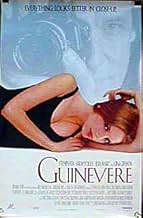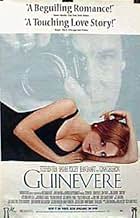NOTE IMDb
5,9/10
2,8 k
MA NOTE
Une jeune fille issue d'une famille aisée se rebelle et se lie avec un photographe beaucoup plus âgé qu'elle.Une jeune fille issue d'une famille aisée se rebelle et se lie avec un photographe beaucoup plus âgé qu'elle.Une jeune fille issue d'une famille aisée se rebelle et se lie avec un photographe beaucoup plus âgé qu'elle.
- Réalisation
- Scénario
- Casting principal
- Récompenses
- 2 victoires et 7 nominations au total
Sharon McNight
- Leslie
- (as Sharon Mcnight)
Avis à la une
Thoughtfully written, well acted, provocatively true to life... this is a movie for the intelligent, mature audience, not a movie to appeal to the lowest common denominator. Those who are too lazy to think (or just unable to!) won't "get it" and will condemn it because it did not hand them an answer on a platter. Those who thought about the story rather than merely reacting and who dug into the emotions found level after level of story and enjoyed the irony of the fact that even the most intelligent among us frequently do something we may later view as stupid. Even so, those "stupid" things help shape who we are, and may be as important to the formation of who we are as the "correct" choices we also make.
Worth the ticket and worth buying it on DVD when available.
Worth the ticket and worth buying it on DVD when available.
This is a murky, unfocused little film. It is clear that Audrey Wells is a talented writer-director, but I felt a lack of assurance in the execution of her story. However, Jean Smart delivers a brilliant performance that enriches the film, making it memorable. She nails every single SECOND of the film she's in; her monologue towards Rea is a devastating piece of acting that was shamefully overlooked by the Academy. This woman is one of the best actresses of her generation, and if you saw her hilarious, Emmy-winning spot on "Frasier" you know she's got strong comedic chops, too. Give Jean Smart better roles!
I can't say exactly what, but something is missing in this movie. Poor Connie. I think he gets less out of the relationships than the Guineveres. Maybe I like things "tied up" too much, but I wish we'd seen a little of Harper's work so we could judge just how well Connie taught her. A scene of her in a gallery or studio somewhere surrounded by her work as she answers a ringing telephone (presumably with Billie on the other end) would have been satisfying--no dialog necessary, just a look of sadness on her face. Whatever else, this movie sure spurred some dialog between my 25-year-old daughter and me.
Interesting that (along with another reviewer) I saw the connection between the Stephen Rea character, Connie, in this movie and Herman Wouk's Noel Airman in the 50's novel "Marjorie Morningstar" and talked about that as we walked home. And as big a bitch as Harper's mother was, she had it right as she saw through Connie. Beautifully acted by all principals!
Interesting that (along with another reviewer) I saw the connection between the Stephen Rea character, Connie, in this movie and Herman Wouk's Noel Airman in the 50's novel "Marjorie Morningstar" and talked about that as we walked home. And as big a bitch as Harper's mother was, she had it right as she saw through Connie. Beautifully acted by all principals!
Writer/director Audrey Wells, who would go on to make 2003's "Under the Tuscan Sun" as well as the recent "Shall We Dance", directed Sarah Polley in 1999's "Guinevere". Wells' forte seems to be characters in search of romance who find it in unexpected places. It was the 'ugly' girl in "Truth About Cats & Dogs", Italy in "Tuscan Sun", and the older man in this film. That older man is played with wild abandon by Stephen Rea, often inappropriately stealing the show. Ignoring Jean Smart's histrionic heavy scene later in the film, and the control Rea's Connie has over Polley's Harper, this is Sarah Polley's film. What make this film work is its sensitivity and subtly, especially toward Harper's youth, naivete, and uncertainty in love and life. It's a sweet film about self-discovery at any age, and although it gets a bit moody toward the end, it works well as a date movie.
This was a slow moving but interesting story about a 50 something bohemian photographer named Connie Fitzpatrick (Stephen Rea) who is a serial seducer of impressionable young women. His seduction is not really about sex, although that is part of it. Instead, it is more of an emotional seduction that involves his creating a symbiotic mentor/protégé relationship that puts him in control while feeding his ego. His latest conquest is Harper Sloane (Sarah Polley), a recent college grad from a wealthy family who is all set to go to Harvard Law School. Clearly lonely and vulnerable and not used to the attention of men, she falls prey to the charms of this free spirited older man and eschews law school to run off with him and live the artsy life.
Director/writer Audrey Wells, whose best previous writing credits were for "The Truth About Cats and Dogs" does an excellent job bringing this story to the screen in her directing debut. Her shooting of the scenes was sensitively done and brought forth a lot of the emotional elements of the story and the characters. It is clear that this was a labor of love for Wells, but as is often the case, directing one's own work takes away the objectivity about the script leaving most of the plot problems intact.
It is believable that an insecure girl could be lured into a relationship by a charming older man who overtly appreciates her and believes in her abilities. May/September romances (or more aptly in this case April/August) are common and usually happen for all the reasons depicted here. The biggest problem with the story was the introduction of Billie (Gina Gershon), one of Connie's earlier alumni, so early in the story. Billie warns Harper of the specific manipulative lines that Connie uses repeatedly with each of his love interests, almost by rote. She gives great detail right down to the way he touched her and the fact that he calls them all Guinevere.
At that point, Harper does exactly what one might expect, she leaves him. Shortly thereafter, the story loses all credibility as she eagerly goes running back to him, knowing full well that she is being totally and impersonally manipulated. The entire relationship after that waits for an emotional explosion that never comes. The whole thing just sort of withers away with the eventual breakup being no more than a fait accompli. The breakup scene was weak and cowardly, which detracted greatly from the dramatic potential. If Wells had put Billie's scene closer to the end of the story to create the last straw it would have been more effective.
Wells also misses a great opportunity to add fireworks by not emphasizing Harper's relationship with her mother (Jean Smart). There was a natural emotional tension between the two and she was the one character who had complete clarity about the relationship. Finally, without giving too much away, the gathering of the five Connie alumni at the end was a bit goofy and highly implausible given the gravity of the situation. However, Wells does eventually redeem herself with a good ending and some of the best imagery of the film.
Sarah Polley was well cast in this film and exuded the pure naivety of a young woman inexperienced in the ways of love. She was wonderfully awkward and vulnerable and it was very believable that she could fall prey to the ministrations of an older man. Polley has a Winona Ryder quality about her and has excellent potential as an actress. It remains to be seen if she can break out of the role of quirky teen.
Stephen Rea was hopelessly miscast in this role. He didn't have the emotional horsepower to play this character. His acting is somewhat stoic and wooden and this character needed to be charming, passionate and obsessive. The part required an actor more like Michael Caine.
The best performance of the film goes to Jean Smart as Harper's outspoken and gregarious mother. She completely steals the movie with her confrontational scene with Connie, explaining to him why he can't make it with women his own age. She is terrific in every scene she is in and the fortune cookie scene is fantastic.
Overall, I rated this film a 7/10. This film will probably be most appealing to men over 50 and women under 25. None of the flaws were fatal, but the pace was slow and the plot implausible in parts. That detracted from an otherwise engaging story and some very good technical filmmaking.
Director/writer Audrey Wells, whose best previous writing credits were for "The Truth About Cats and Dogs" does an excellent job bringing this story to the screen in her directing debut. Her shooting of the scenes was sensitively done and brought forth a lot of the emotional elements of the story and the characters. It is clear that this was a labor of love for Wells, but as is often the case, directing one's own work takes away the objectivity about the script leaving most of the plot problems intact.
It is believable that an insecure girl could be lured into a relationship by a charming older man who overtly appreciates her and believes in her abilities. May/September romances (or more aptly in this case April/August) are common and usually happen for all the reasons depicted here. The biggest problem with the story was the introduction of Billie (Gina Gershon), one of Connie's earlier alumni, so early in the story. Billie warns Harper of the specific manipulative lines that Connie uses repeatedly with each of his love interests, almost by rote. She gives great detail right down to the way he touched her and the fact that he calls them all Guinevere.
At that point, Harper does exactly what one might expect, she leaves him. Shortly thereafter, the story loses all credibility as she eagerly goes running back to him, knowing full well that she is being totally and impersonally manipulated. The entire relationship after that waits for an emotional explosion that never comes. The whole thing just sort of withers away with the eventual breakup being no more than a fait accompli. The breakup scene was weak and cowardly, which detracted greatly from the dramatic potential. If Wells had put Billie's scene closer to the end of the story to create the last straw it would have been more effective.
Wells also misses a great opportunity to add fireworks by not emphasizing Harper's relationship with her mother (Jean Smart). There was a natural emotional tension between the two and she was the one character who had complete clarity about the relationship. Finally, without giving too much away, the gathering of the five Connie alumni at the end was a bit goofy and highly implausible given the gravity of the situation. However, Wells does eventually redeem herself with a good ending and some of the best imagery of the film.
Sarah Polley was well cast in this film and exuded the pure naivety of a young woman inexperienced in the ways of love. She was wonderfully awkward and vulnerable and it was very believable that she could fall prey to the ministrations of an older man. Polley has a Winona Ryder quality about her and has excellent potential as an actress. It remains to be seen if she can break out of the role of quirky teen.
Stephen Rea was hopelessly miscast in this role. He didn't have the emotional horsepower to play this character. His acting is somewhat stoic and wooden and this character needed to be charming, passionate and obsessive. The part required an actor more like Michael Caine.
The best performance of the film goes to Jean Smart as Harper's outspoken and gregarious mother. She completely steals the movie with her confrontational scene with Connie, explaining to him why he can't make it with women his own age. She is terrific in every scene she is in and the fortune cookie scene is fantastic.
Overall, I rated this film a 7/10. This film will probably be most appealing to men over 50 and women under 25. None of the flaws were fatal, but the pace was slow and the plot implausible in parts. That detracted from an otherwise engaging story and some very good technical filmmaking.
Le saviez-vous
- AnecdotesDuring the non-union shoot in San Francisco, crew members struck and were joined by star Sarah Polley, who walked the picket line. Striking crew members report that they were quite touched by her action, which was more than a gesture, but rather a sincere belief in workers' rights. On her part, Polley called her union, the Screen Actors Guild, to tell them of her action, and the union representative told her they'd back her if she crossed the picket line. SAG assumed that she was calling to ask whether she could defy the strike and cross the picket line! A shocked and dismayed Polley stayed out with the strikers, and the strike ended after three days when their grievances were met. Subsequently, Polley has stated that she has been told that she lost several job offers due to this incident as producers don't want a union 'militant' despite the film industry being a craft industry dominated by the guild (union) system and she did what she felt was right.
- GaffesThe wet spots on Harper's shirt after taking a shower. They're inconsistent.
- Citations
Harper Sloane: You're obviously mistaking me for someone with potential.
- Bandes originalesCoquette
Music by Carmen Lombardo & Johnny Green
Lyrics by Gus Kahn
Performed by John Pizzarelli
Courtesy of The RCA Records Label of BMG Entertainment
Meilleurs choix
Connectez-vous pour évaluer et suivre la liste de favoris afin de recevoir des recommandations personnalisées
- How long is Guinevere?Alimenté par Alexa
Détails
Box-office
- Budget
- 2 600 000 $US (estimé)
- Montant brut aux États-Unis et au Canada
- 632 283 $US
- Week-end de sortie aux États-Unis et au Canada
- 54 145 $US
- 26 sept. 1999
- Montant brut mondial
- 635 680 $US
- Durée
- 1h 44min(104 min)
- Couleur
- Mixage
- Rapport de forme
- 1.85 : 1
Contribuer à cette page
Suggérer une modification ou ajouter du contenu manquant
































